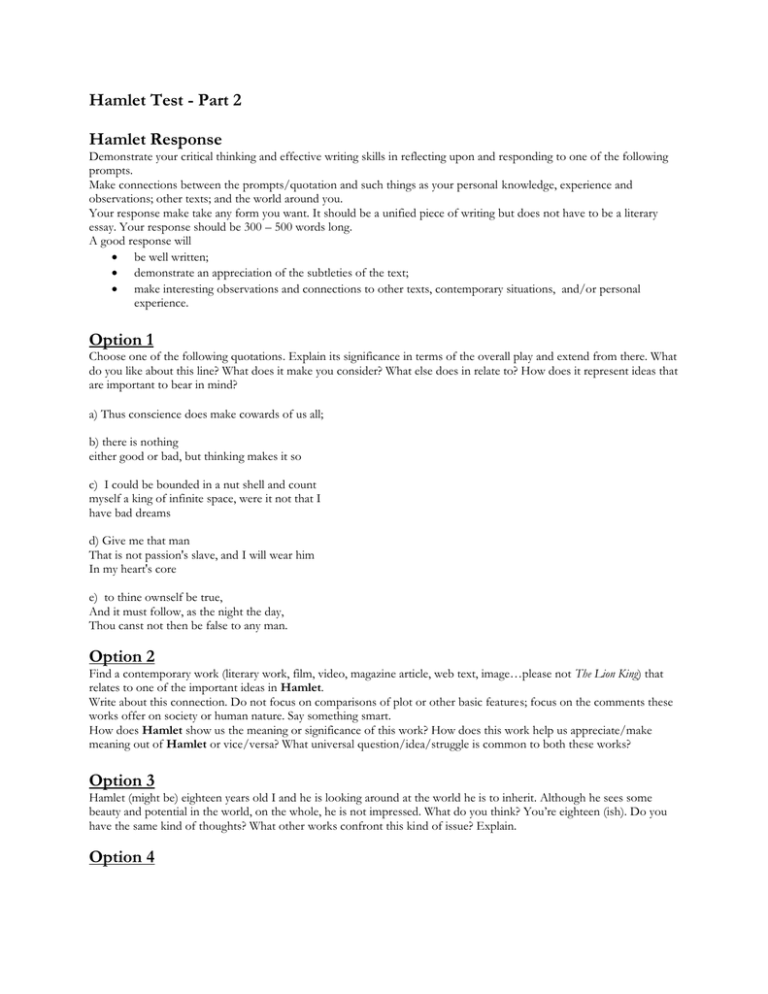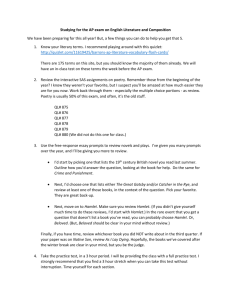Hamlet Test - Risk English
advertisement

Hamlet Test - Part 2 Hamlet Response Demonstrate your critical thinking and effective writing skills in reflecting upon and responding to one of the following prompts. Make connections between the prompts/quotation and such things as your personal knowledge, experience and observations; other texts; and the world around you. Your response make take any form you want. It should be a unified piece of writing but does not have to be a literary essay. Your response should be 300 – 500 words long. A good response will be well written; demonstrate an appreciation of the subtleties of the text; make interesting observations and connections to other texts, contemporary situations, and/or personal experience. Option 1 Choose one of the following quotations. Explain its significance in terms of the overall play and extend from there. What do you like about this line? What does it make you consider? What else does in relate to? How does it represent ideas that are important to bear in mind? a) Thus conscience does make cowards of us all; b) there is nothing either good or bad, but thinking makes it so c) I could be bounded in a nut shell and count myself a king of infinite space, were it not that I have bad dreams d) Give me that man That is not passion's slave, and I will wear him In my heart's core e) to thine ownself be true, And it must follow, as the night the day, Thou canst not then be false to any man. Option 2 Find a contemporary work (literary work, film, video, magazine article, web text, image…please not The Lion King) that relates to one of the important ideas in Hamlet. Write about this connection. Do not focus on comparisons of plot or other basic features; focus on the comments these works offer on society or human nature. Say something smart. How does Hamlet show us the meaning or significance of this work? How does this work help us appreciate/make meaning out of Hamlet or vice/versa? What universal question/idea/struggle is common to both these works? Option 3 Hamlet (might be) eighteen years old I and he is looking around at the world he is to inherit. Although he sees some beauty and potential in the world, on the whole, he is not impressed. What do you think? You’re eighteen (ish). Do you have the same kind of thoughts? What other works confront this kind of issue? Explain. Option 4 The Atlantic Magazine asked a bunch of famous people to identify the “Greatest fictional character of all time.” Two people (out of around 10) chose Hamlet. Comment on one (or both, if you want) of their comments. Do you agree? Disagree? Why? Here’s what they said: Mark Haddon, author, The Red House and The Curious Incident of the Dog in the Night-Time Even in 1599 or thereabouts, Hamlet feels like us: depressed, conflicted, alienated, trapped. Or maybe he just feels like me. Alec Baldwin, actor For men, it’s a toss-up between the Prince of Denmark and the Thane of Cawdor: paralysis through inaction versus over-aggression. It’s a toss-up for the ladies as well, between Jane Eyre (life) and Blanche DuBois (death).




